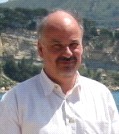Optimization and Control of Chromatography
Prof. Sebastian Engell, Universität Dortmund,
co-authored with Abdelaziz Toumi
Preparative chromatography is attracting more and more interest from the
fine chemicals and pharmaceutical industry, both for product development
and commercial production. In the development of Life Science products, an
important step is the choice and the design of cost-efficient unit
operations for purification. Precursors for pharmaceuticals often have to
be nearly 100% pure due to regulatory demands. Sometimes their
physico-chemical properties differ little from those of the by-products,
and they may be thermally unstable. In these cases, standard separations
such as distillation are not applicable. Therefore chromatographic
separation processes which can be operated at low temperatures are
increasingly used for preparative separations of products in the food,
fine chemicals and pharmaceutical industries. The classical
chromatographic separation process is batch chromatography where a column
is charged with pulses of the feed solution and the components separate as
the mixture travels along the column. A more effective variant with
respect to solvent consumption and utilisation of the adsorbent is SMB (simulated
moving bed) chromatography where a number of columns (usually 6-16) are
arranged in a closed loop and a continuous separation is achieved by
switching the input and output ports. The price for the higher
effectiveness of the SMB process and its variants is their considerably
higher complexity and sensitivity to the operating parameters which makes
the choice of the plant setup and the operating conditions a challenging
task and necessitates close supervision and control if the process is
operated near the economic optimum. Due to the distributed, nonlinear
character of the processes, chromatographic separations call for the use
of advanced control concepts and on-line optimization We report on the
results of a long-term research effort on the operation of chromatographic
separations which has been performed in close co-operation with the plant
design group in our department. First a rigorous model-based approach to
the optimization of the configuration and the operating parameters of
continuous chromatographic separations is presented, including the newly
introduced VARICOL process where the ports are switched asynchronously.
Then a “classical” control approach is discussed where the optimal
operation point characterized by the positions of the concentration fronts
is stabilized against disturbances by feedback control. This however
cannot assure optimality if process parameters change. Therefore a direct
optimization-based control concept was developed where the desired product
purities do not appear as control objectives but as constraints while an
economic cost function is minimized on-line. The effectiveness of this
concept is demonstrated by experiments at a pilot plant for reactive
chromatography. A key problem in model-based optimization and operation of
chromatographic processes is the need for an accurate process model. It is
usually very time-consuming and costly to determine the crucial parameters
of the process, in particular the adsorption isotherms, experimentally. In
our MPC concept, this problem is solved by on-line re-estimation of the
key parameters of the process model. We demonstrate that in SMB processes,
the information which is gained during operation is sufficient for good
estimations. In batch chromatography, the situation is less favourable so
that there is a strong interest in on-line optimization techniques which
work without an accurate process model. A suitable approach is proposed.
 Sebastian Engell received his Dipl.-Ing. Degree in Electrical
Engineering from the Ruhr-Universitaet Bochum, 1978. He also holds a
Dr.-Ing. degree in Control Theory from the Universitaet Duisburg, 1981. He
is currently a Professor of Process Control at the University of Dortmund,
Department of Chemical Engineering. His research interests concern hybrid
systems, especially modelling, simulation and optimization, and control
systems design. He is the Co-Editor of the IEEE Transactions on Control
Systems Technology and Associate Editor of the European Journal of Control.
Sebastian Engell received his Dipl.-Ing. Degree in Electrical
Engineering from the Ruhr-Universitaet Bochum, 1978. He also holds a
Dr.-Ing. degree in Control Theory from the Universitaet Duisburg, 1981. He
is currently a Professor of Process Control at the University of Dortmund,
Department of Chemical Engineering. His research interests concern hybrid
systems, especially modelling, simulation and optimization, and control
systems design. He is the Co-Editor of the IEEE Transactions on Control
Systems Technology and Associate Editor of the European Journal of Control.